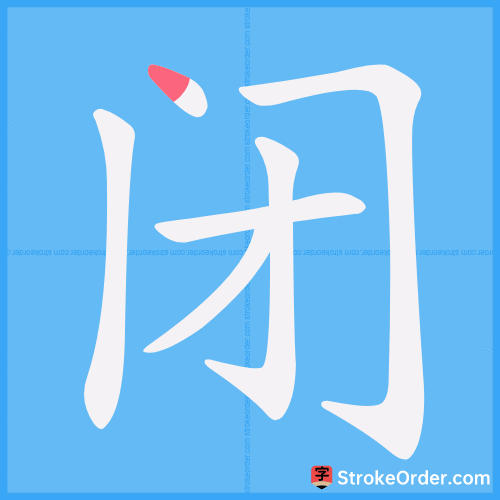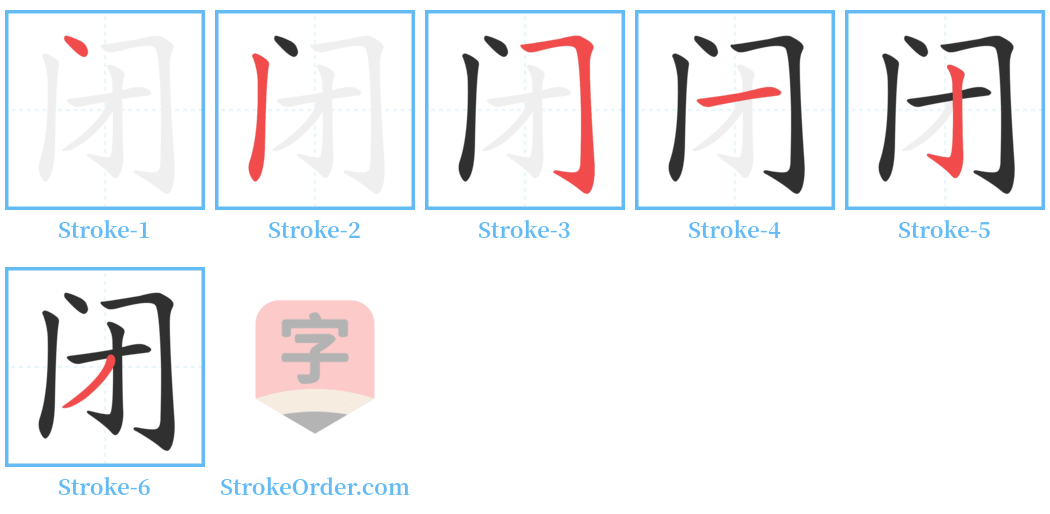闭 Stroke Order
Animated Stroke Order of 闭

Stroke Order Diagrams for 闭

Step-by-Step Handwriting Guide for 闭

Learn to Write Chinese Characters with Video Tutorials
Watch the video of writing the Chinese character "闭", learn the correct stroke order (笔顺) of the character "闭", and master the standard way of writing the character "闭".
Free Printable Handwriting Practice with Stroke Order: 闭
Printable Writing Practice Worksheet of "闭" in Portrait Orientation (Tian Zi Ge)

Printable Writing Practice Worksheet of "闭" in Landscape Orientation (Tian Zi Ge)

Information of 闭
Pinyin
bì
Radical
门
Strokes
6 strokes
Usage
★★★★★
Definition
to close / stop up / shut / obstruct
闭
bì
1.关,合。 (To close; to shut.)
- 封~。 (Seal up.)
- ~门。 (Close the door.)
- ~合。 (Close together.)
- ~关锁国。 (Shut the nation.)
- ~门思过。 (Close the door and reflect.)
- ~月羞花。 (Close the moon and shame the flowers.)
2.结束,停止。 (To end; to stop.)
- ~会。 (End the meeting.)
- ~幕。 (Close the curtain.)
- ~市。 (Close the market.)
3.堵塞,不通。 (To stop up; to obstruct.)
- ~气。 (Stop the air.)
- ~塞(sè)。 (Block up.)
4.姓。 (A surname.)
动 (Verb)
- 【本义】:关门,把门合闭起来 (Original meaning: Close the door.)
- 【造字法】:会意。从门,从才。“才”是用来闭门的东西。 (Character formation: Ideogram; from the door and "cai" which refers to the mechanism used to close the door.)
1.同本义 ([En.] shut the door)
- 引: 《说文》:闭,阖门也。 (Shuōwén: To close is to shut the door.)
- 《墨子号令》:门常闭。 (Mòzi: The door is often closed.)
- 《易·象传》:先王以至,日闭关。 (Yì: When the former kings arrived, the doors were closed.)
- 《庄子·天运》:坚闭门而不出。 (Zhuāngzǐ: Shut the door tightly and do not go out.)
- 《左传·哀公十五年》:门已闭矣。 (Zuǒzhuān: The door is already closed.)
- 《礼记·中庸》:古语所谓闭门造车,出门合辙,盖言其法之同也。 (Lǐjì: An old saying refers to shutting the door to make a cart; it implies similar principles.)
- 例: 又如:闭扫(即闭门欲扫。指闭门谢客) (For example: closing the door to clean or rejecting visitors.)
- 例: 又如:闭影(关门不与外界往来) (For example: closing the door to cut off contact with the outside world.)
2.泛指闭合,合拢 ([En.] close; shut.)
- 引: 《史记·张仪列传》:愿陈子闭口,毋复言。 (Shǐjì: I hope you will keep your mouth shut and say no more.)
- 例: 又如:闭目;闭嘴;闭合电路;闭口结舌;闭卷(答题时不能查阅有关资料的考试方法) (For example: close one's eyes; shut one's mouth; close the circuit; tongue-tied; closed book exam (where resources cannot be consulted).)
3.壅塞不通 ([En.] stop up; obstruct.)
- 引: 《国语·晋语》:闭而不通。 (Guóyǔ: Stopped up and unable to pass through.)
- 例: 又如:闭绝(堵塞;杜绝);闭心(闭绝欲望) (For example: blockage; closing off desires.)
4.禁绝 ([En.] prohibit.)
- 引: 《史记·乐书》:礼者,所以闭淫也。 (Shǐjì: Etiquette is for the purpose of prohibiting immorality.)
- 例: 又如:闭淫(禁绝邪淫);闭钳(禁制);闭籴(禁止输出,封闭其买入米谷的通道) (For example: prohibit immoral behavior; restrict; close the supply channels.)
5.停止;结束 ([En.] stop; end).
- 例: 如:闭歇(停业);闭经;闭会 (For example: closing down; end of studies; end the meeting.)
名 (Noun)
1.门闩的孔 ([En.] hole in bolt.)
- 引: 《韩非子·主道》:不谨其闭,不固其门,虎乃将存。 (Hánfēizǐ: If you don’t pay attention to the closure, the door won’t be secure and tigers will invade.)
- 例: 又如:键闭 (For example: keyhole.)
2.古时称立秋、立冬为“闭”,意即开始闭藏的气节 ([En.] the Beginning of Autumn or Winter.)
- 引: 《左传》:凡分、至、启、闭,必书云物。 (Zuǒzhuān: At the seasons of division, arrival, initiation, and closure, one must write about the changes.)
to stop up / to close up / hard to get to / out of the way / inaccessible / unenlightened / blocking
to seal / to close / to confine / to seal off / to close down / sealed / confined / closed / unreceptive
to close by coming together (like the lips of a wound, the doors of an elevator, the walls of a channel) / to close by connecting in a loop (like a circuit) / closed-loop
to close the passes / to seal off the country / seclusion (monastic practice, e.g. of Chan Buddhists)
Input Method for 闭
Pinyin
bi4
Wubi
ufte
Cangjie
lsdh
Zhengma
tldm
Four Corner
37241
Unicode
U+95ed
Same Pronunciation Characters